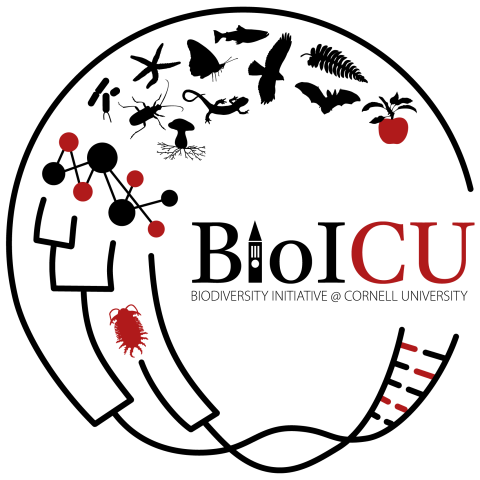Our Moonshot
The CALS transdisciplinary moonshot hiring initiative is actively assembling collaborative teams of faculty to unlock holistic solutions through visionary research, teaching, outreach and innovation. Empowering Biodiversity for People and Planet is one of 5 Moonshot hiring initiatives supported by CALS, and is a signature initiative for the BioICU.
As its core, our moonshot has the goal of curbing biodiversity loss through translational research that leverages Cornell’s Natural History Collections and Natural Area Reserves to build world class field-based research and teaching programs that build biodiversity literacy and directly address the biodiversity crisis from local to global scales. Positions we are hiring are:
Plant Biodiversity and Adaptation (School of Integrative Plant Science): We are seeking a colleague who will leverage plant biodiversity and employ state-of-the-art approaches to understand fundamental mechanisms of convergent evolution and adaptation as a means of addressing the biodiversity crisis. The research will enable us to predict when and how species can adapt rapidly in the face of global climate change and promote an understanding of the interface between biological systems and environmental extremes to effect solutions at a local to global scale. The ideal candidate will develop an innovative research and teaching program that addresses plant adaptation at organismal, population and/or landscape levels and links fields such as evolutionary genetics and genomics, ecological genetics, comparative phylogenomics, and functional genomics with modelling of macro- and/or micro-evolutionary patterns and processes, conservation biology and sustainability science to develop integrative approaches that build and use natural history collections in an extended specimen framework.
Population biology and the Genomic Architecture of Species Success (Computational Biology): With loss of habitat, many species of plants and animals are seeing severe reductions in population size, while others are losing diversity in form and function as they adapt to more severe and marginal conditions. We are only beginning to understand the underlying mechanisms that determine how population restriction impacts extinction risk. Comparative genomic sampling from collapsing and thriving populations, together with analyses of historical samples, offer exciting prospects to deepen our understanding of the genetic architecture of fitness and adaptive potential, which will be critical for guiding the establishment of resilient populations for the future. The ideal candidate will use their research program to directly inform biodiversity conservation efforts and forge new ground by integrating historically siloed disciplines, addressing questions across scales or innovating novel approaches to measuring and modeling population resilience factors.
Insect Biodiversity and Conservation (Entomology): The successful candidate will conduct research at the intersection of arthropod biodiversity and global change ecology, including the causes and consequences of changes in patterns of abundance, distribution, and species richness. We are seeking a colleague who will work with collections-based data, contribute to the growth and development of the Cornell University Insect Collection, and play an active role in teaching and curriculum development in insect biology and biodiversity. Preference will be given to candidates who use phylogenetic methods, biodiversity informatics, spatial modeling, biogeography, or trait-based organismal biology.
Informatics of global biodiversity patterns (DNRE): Curbing biodiversity loss and assessing trends that impact ecosystem health and sustainability requires integration of data from different organismal and environmental sources. We seek to hire a faculty member who will generate, aggregate, and analyze massive biodiversity datasets that inform practices and policies aimed at resolving our planetary crisis. This research will build a Cornell-based framework to interrogate how biodiversity is generated, maintained, and sustained and how trends are links with environmental change. The ideal candidate will be involved in global conversations about best practices in data generation, collection, storage, curation, analyses, access, and community partnerships. The research program developed by this faculty member will integrate Cornell’s extensive biodiversity collections with ongoing field collected data, engaging critically with Economics of Biodiversity research to generate data and predictions tied to economic impacts (e.g. economic damage of invasive species in natural and agricultural settings; economic benefits of symbioses). Compelling candidates will build a computationally sophisticated research program that integrates ‘big data’ on organismal diversity and the environment to address fundamental biological questions and applied conservation challenges from local to global scales. Anticipated advertisement date = Fall 2024.
The Economics of Biodiversity (Dyson): we seek a colleague who will develop the scientific basis for comprehensive biodiversity and natural capital valuation and its application to policy making. The candidate will study how economic incentives shape human behavior toward biodiversity, and how the basic conceptualizations of sustainability—understood as justice in human-nature relationships—can be translated into valuating ecosystem services and natural capital at the landscape scale. They will also study the effectiveness and tradeoffs of alternative economic policy instruments to drive solutions to the biodiversity crisis. Combining capital theory and empirical non-market valuation, the candidate will answer important questions, such as: where do societal decision-makers face the largest information gaps and uncertainties with respect to different values of biodiversity and natural capital? What are the key quantitative parameters required to value natural capital? How can societal decision-makers best use biodiversity valuation, and how do (or should) they deal with limited information? The ideal candidate’s methodical expertise will comprise quantitative ecological-economic modeling, dynamic optimization, statistics, and economic experiments; they will interact with social and biological scientists across Cornell’s campus to develop robust tools for assessing the ecological and regulatory impact of economic solutions on the biodiversity crisis. Anticipated advertisement date = Fall 2024.


